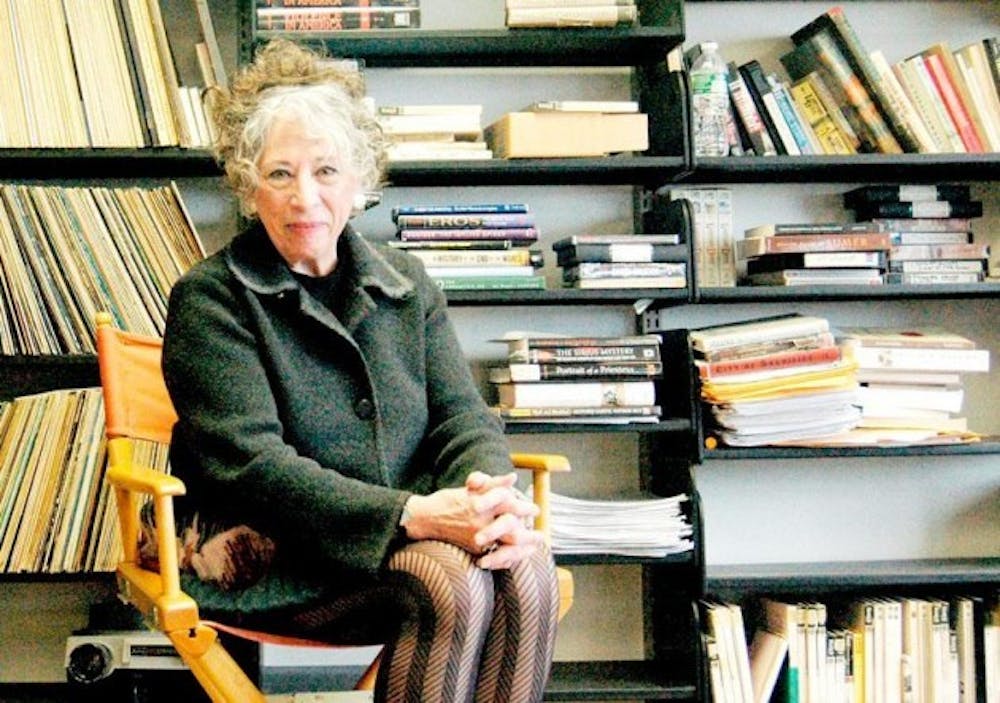UB's English Department regularly ranks among the best in the country, according to the U.S. News & World Report rankings. Though some people put much stock into these types of departmental rankings, some UB English students and professors have other ideas about what makes their department particularly special.
In 2012, the popular news magazine and ranking source ranked UB's graduate concentration in literary theory and criticism as the ninth best in the nation. This placed UB's program ahead of those at private educational giants like Harvard, Brown and Stanford, positively highlighting the school and the department in particular.
When examining what makes the department special, SUNY Distinguished Professor Bruce Jackson likes to begin by looking at the faculty.
Jackson first came to work at UB in 1967 and has been here ever since. He attributes his long stay largely to the other faculty who have been part of his "company," in the words of the late poet and UB Professor Robert Creeley. Jackson, who turned down job offers from the University of California, Los Angeles, University of Pennsylvania and the Massachusetts Institute of Technology to come to Buffalo, said there wasn't much contest when choosing where to work.
"The reason I came here [over] those other places is this had, by far, the hottest literary group of people in one place in the United States," Jackson said. "And they weren't one kind. It had poets, fiction writers, critics, people who could film; everything was going on here. There were some people in the department who had no degrees at all, and it was 62 people, and, of course, that group drew great students, and so it was by far and away the most interesting place to go."
This "hot" faculty group was also instrumental in bringing SUNY Distinguished Teaching Professor Diane Christian to UB three years after Jackson, instead of accepting an offer from the University of California, Berkeley. She believes the faculty is one of the things that did, and still does, set UB's English Department apart from others across the nation.
"The thing that really made it different was that it had the artists," Christian said. "When I first came here, my first year, [John Maxwell] Coetzee, the Nobel Prize winner, was my officemate. He later went back to South Africa and went on to be a very great novelist, but there was just fabulous intellectual energy and it was unique in that way."
Jackson praised the department's low turnover rate. He said it separates UB's English Department from those at other schools. Christian, who is married to Jackson, agreed.
"We've really kept an amazing amount of people," Christian said. "We've had fabulous retention and it's because of that energy and innovation - you can't just make a company like that happen. You can go to a place that would be more prestigious. For example, Berkeley would've been more prestigious, but that department has never been as interesting as this department, ever."
The talent and caliber of the professors at UB has remained very much the same over the years, thanks to excellent hiring on the part of the university and an effort to keep the faculty here, Jackson said.
Though some may argue Buffalo is merely a Rust Belt shell of its former self, there are those, like Associate Professor David Schmid, who see the city's positive qualities. He attributes part of the department's strength to Buffalo itself and to the type of students who choose to come to school in this city, particularly at UB. When looking for a job, Schmid knew he wanted to work at a state school after leaving Stanford, and Buffalo seemed like the perfect fit.
"I also wanted to live in a place that was like a real city, and Buffalo had that kind of grittiness that I found really appealing," Schmid said. "And I'm a first-generation college student, so I really liked the idea of coming to a big state place that still has first-generation college students - that still has a lot of kids working to stay in school and that kind of thing."
The professors believe Buffalo - a city that is "laid back, nice, not full of itself and full of a great artistic energy," in Christian's words - is the perfect place for an English Department that's as active as UB's to thrive.
"Buffalo's a small city," Jackson said. "And unlike New York or Los Angeles, if you're doing stuff, it's easy to get access to major venues ... So, in a way, the whole city is our turf and is a city that's friendly to people like us."
UB's English students, who Christian believes to be "not full of themselves, kind of laid back, shrewd," just like the city they live in, have always been a strength to the department, according to Jackson.
"Over the years we've been here, the students have gotten better and better, although they've always been good," Jackson said. "That's one of the reasons we've stayed. I taught several classes at Harvard while I was there and people said, 'Weren't these students a disappointment after Harvard?' And I said, 'Nope.'"
Katherine Manion, who majored in English as an undergraduate, is now a master's candidate in the Graduate School of Education. She readily recounted not only the strength of UB's English Department, but also the ways in which it carefully prepared her for graduate school.
One strength of the English Department that Manion highlighted was the large amount of physical resources at the disposal of students for research purposes. These include some of James Joyce's original manuscripts, a copy of Shakespeare's Folio and many other first-edition publications of major authors.
Manion also noted the faculty's role in her success.
"I was really able to take the close-reading and analytical skills I learned in the English program and bring them into the graduate setting," Manion said in an email. "Most of my professors really pushed me to try harder. There was never a professor who just assumed that I had done my best and was going to let me get by. They were constantly pushing me to try harder, or to think deeper, or look further into a topic."
Manion believes not only are the professors strong at pushing their students to work harder, but they're also still among the most impressive English scholars in the country.
"The faculty at UB is the pick of the crop," she said. "They are still the movers and shakers in their respective fields of English study. They aren't just rehashing what other academics have said on the topic; they are the ones who are writing what other professors are assigning."
This "moving and shaking" hasn't stopped since Jackson and Christian arrived at UB nearly half a century ago. Jackson said having an excelling English Department with students willing to learn is vital because "without it, you're just a trade school."
Christian echoed the sentiment and highlighted the worth of studying English in an academic context and in life outside of college.
"It really is the liberal art; it has to do with living, it has to do with values and it has to do with the things that are really necessary to being a human being, not just having a job," Christian said. "I love it that you might not be able to use it any way except to think and be happy."
email: news@ubspectrum.com




